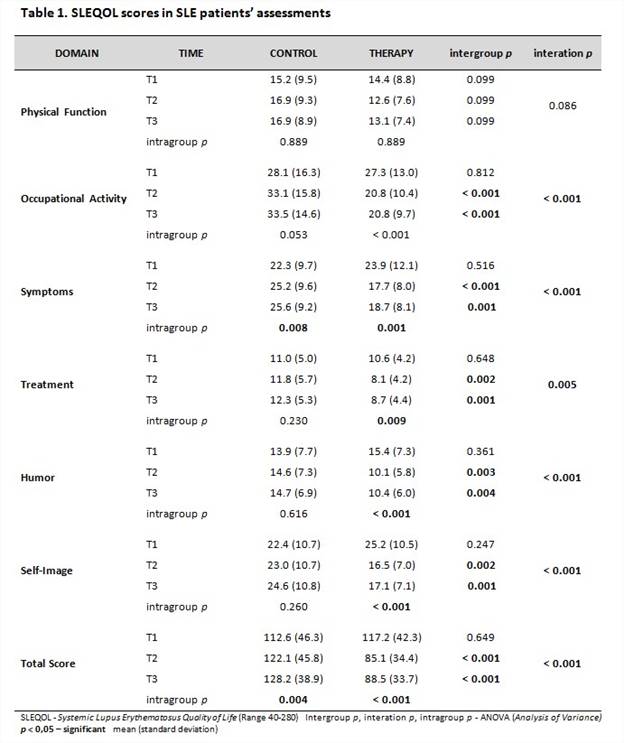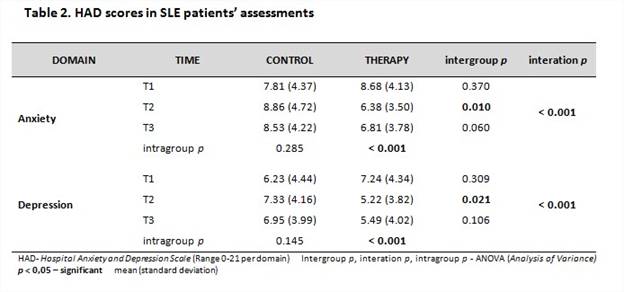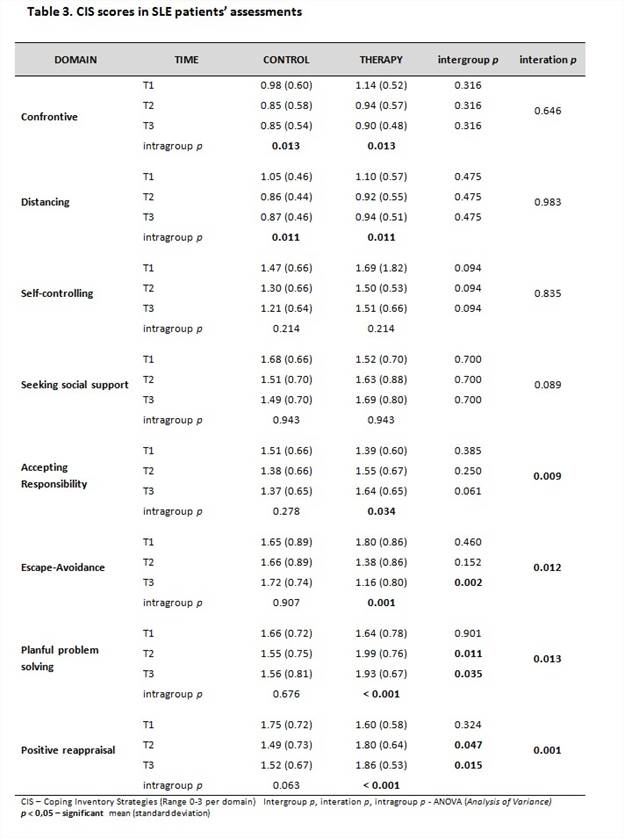Session Information
Session Type: ARHP Concurrent Abstract Session
Session Time: 2:30PM-4:00PM
Background/Purpose: There are few studies evaluating the effectiveness of psychotherapy in Systemic Lupus Erythematosus (SLE) patients.
Objectives: To evaluate the effectiveness of brief group psychoanalytic psychotherapy (BGPP) in improving quality of life, anxiety and depression levels and coping strategies in SLE. Methods: Prospective, randomized clinical trial (number NCT01840709), including 80 SLE patients in a tertiary hospital. Patients were randomized into two groups: therapy (TG n=37) and control (CG n=43). Both groups received standard clinical treatment. TG received BGPP, weekly for 20 consecutive weeks performed by a specialized psychologist. CG remained in the waiting list. Assessments: at baseline (T1), after 20th weeks (T2), and 24 months after the end of the study (T3). Damage and disease activity were assessed by SLICC/ACR-DI score and SLEDAI-2k score, respectively. Self-administered questionnaires supervised by a blind evaluator were used to evaluate symptoms (SLE-SSC), quality of life (SLEQOL), anxiety and depression (HAD) and coping strategies (CIS). Inclusion criteria: female gender; SLE (ACR-1997 classification criteria), age ≥ 18 years, minimum follow-up of six months and signing consent form approved by Institutional Ethic Committee. Exclusion criteria: illiterate patients, physical and mental comorbidities that preclude the attendance, and external psychological treatment. Statistical analysis: intent to treat analysis. Comparisons of variance between groups over time (ANOVA repeated measures). SPSS version 17. p <0.05 was considered significant.
Results: At baseline, TG and CG were homogeneous in all variables, including medication. In T2, TG showed significant improvement in the majority of domains of SLEQOL (Table 1), all domains of HAD (Table 2) and several domains of CIS (Table 3). Some of benefits were maintained at the 24-month follow-up after the end of the therapy, including the most appropriate coping strategies to face the disease. No significant differences were observed in medication and clinical variables.
Conclusion: This study showed effectiveness of BGPP in improving quality of life, depression, anxiety and coping strategies to deal with stress in SLE patients, and some of the benefits were maintained in a long follow-up.
To cite this abstract in AMA style:
Sato E, Conceiçao C, Meinão I, Blay S. Effectiveness of Brief Group Psychoanalytic Psychotherapy in Patients with Systemic Lupus Erythematosus and Follow-up [abstract]. Arthritis Rheumatol. 2017; 69 (suppl 10). https://acrabstracts.org/abstract/effectiveness-of-brief-group-psychoanalytic-psychotherapy-in-patients-with-systemic-lupus-erythematosus-and-follow-up/. Accessed .« Back to 2017 ACR/ARHP Annual Meeting
ACR Meeting Abstracts - https://acrabstracts.org/abstract/effectiveness-of-brief-group-psychoanalytic-psychotherapy-in-patients-with-systemic-lupus-erythematosus-and-follow-up/



